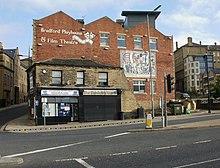Bradford Playhouse
| Bradford Civic Playhouse Priestley Theatre |
|
 |
|
| Address | Chapel Street, Little Germany Bradford England |
|---|---|
| Coordinates | 53°47′38″N 1°44′44″W / 53.79379°N 1.74554°WCoordinates: 53°47′38″N 1°44′44″W / 53.79379°N 1.74554°W |
| Construction | |
| Opened | 1929 |
| Reopened | January 1937 |
| Rebuilt | 1936 |
| Website | |
| http://www.bradfordplayhouse.org.uk | |
Bradford Playhouse is a 290-seat proscenium arch theatre with circle and stall seating based in Little Germany, in the city of Bradford, West Yorkshire, England. Formerly known as The Priestley, the theatre also has a studio space which has flexible lighting, sound, and seating arrangements.
The theatre was founded by an amateur group, the Bradford Playhouse Company, in 1929, renting Jowett Hall – an ex-Temperance Hall previously used as a cinema – as its premises. The Bradford company was an offshoot of the Leeds Civic Playhouse Company, and became independent of its parent in 1932.
J. B. Priestley became President of the theatre in 1932, when it separated from Leeds Civic Theatre, and remained President until his death in 1984. His sister Winnie, who had been the Secretary of the Bradford branch of the Leeds Civic Theatre, went on to serve as Secretary to the independent Bradford Civic Theatre, and is commemorated by a plaque in the theatre.
In 1934, Priestley wrote of the Bradford Civic Theatre in his book English Journey.
"Bradford has a Civic Theatre, of which I happen to be President... Even now, many people do not realise that there is a chain of such theatres, small intelligent repertory theatres organised on various lines, stretching across the country. Most of them have to struggle along, … this dramatic movement, … is of immense social importance – To begin with, it is a genuine popular movement, not something fostered by a few rich cranks. The people who work for these theatres are not by any means people who want to kill time. They are generally hard-working men and women … whose evenings are precious to them … and they are tremendously enthusiastic, even if at times they are also like all theatrical folk everywhere – given to quarrelling and displays of temperament ...These theatres are very small and have to fight for their very existence, but … I see them as little camp-fires twinkling in a great darkness. Readers … may possibly not care twopence if every playhouse in the country should close tomorrow. The point is that in communities that have suffered the most from industrial depression, among younger people who frequently cannot see what is to become of their jobs and their lives, these theatres have opened little windows into a world of ideas, colour, fine movement, exquisite drama, have kept going a stir of thought and imagination for actors, helpers, audiences, have acted as outposts for the army of the citizens of tomorrow, demanding to live."
...
Wikipedia
